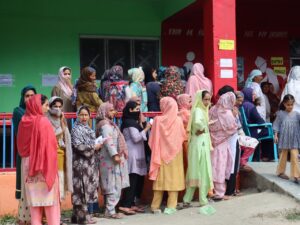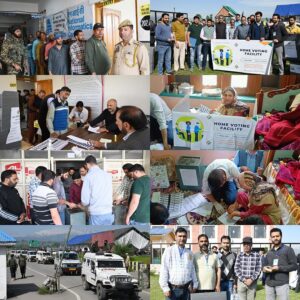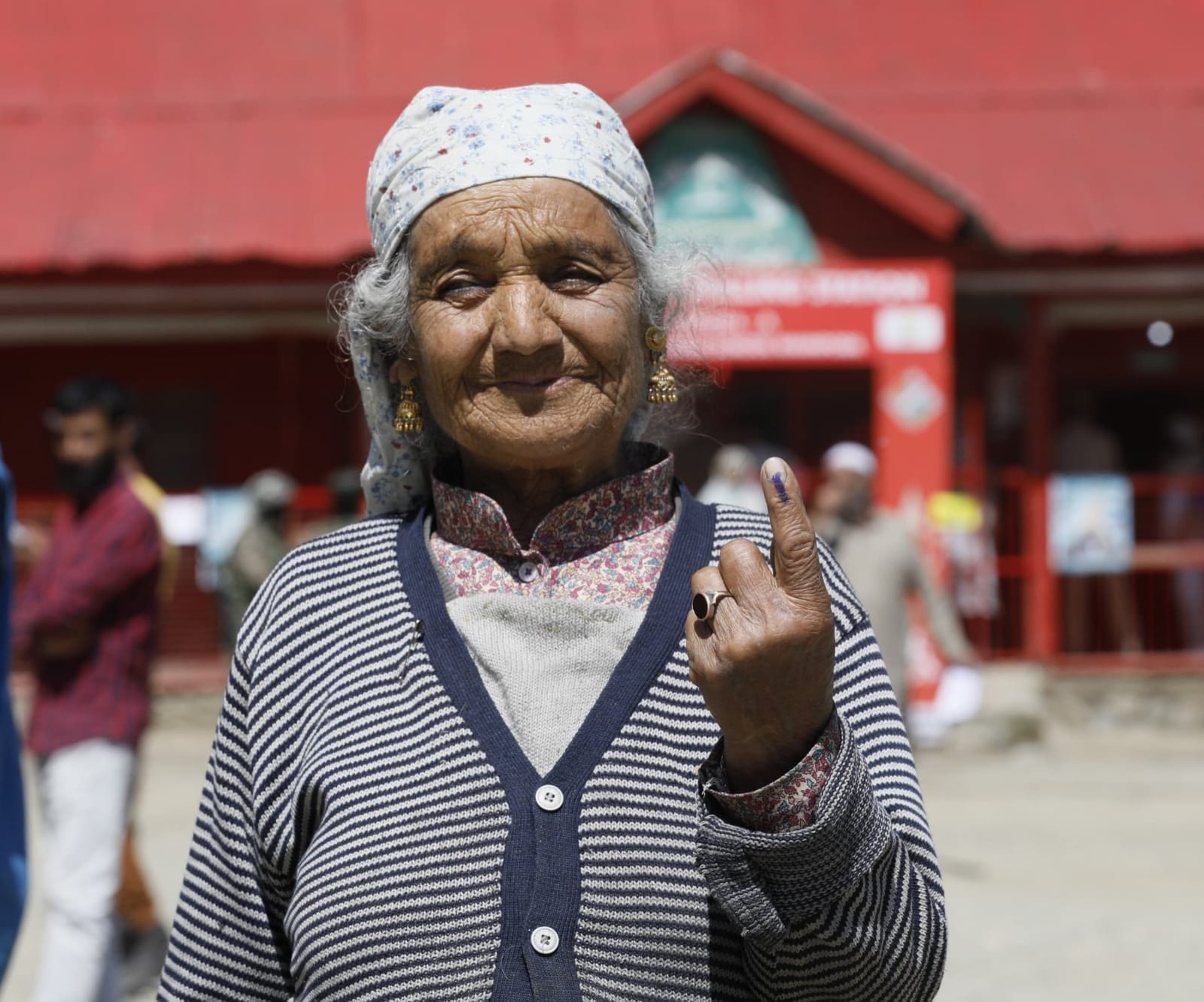The recent Lok Sabha elections in Kashmir saw a big increase in voters, showing a major change in local politics. More people, especially young voters, are getting involved and want leaders who can solve problems like joblessness and poor infrastructure. Even though people have been disappointed before, there’s hope that new leaders will bring new ideas and improvements to the area.
By Ajaz Rashid
In a striking departure from its historical trend of low voter turnout and political apathy, Kashmir region witnessed a record turnout in the recent Lok Sabha elections in twin Lok Sabha constituencies in Srinagar and Baramulla.
Notably, Baramulla set a new precedent with an unprecedented 59% voter turnout, breaking previous records and highlighting significant changes in the region’s political landscape. Similarly, Srinagar saw a notable increase in political participation, with a 36% turnout, the highest since 1998, as per the Chief Election Office Jammu and Kashmir.
On May 13, voters in Srinagar took to the polls amid a palpable political fervor. This election marked a significant shift from previous years, where voter turnout often languished below 14%, largely due to widespread boycotts and separatist sentiment. This year, however, political engagement surged driven by a renewed focus on ideological issues rather than the traditional promises of basic infrastructure like roads, electricity, and water.
The contest in Srinagar was primarily between former allies, the National Conference (NC) and the Peoples Democratic Party (PDP), both of which are part of the People’s Alliance for the Gupkar Declaration. This coalition aims to restore the special constitutional status of Jammu & Kashmir that was revoked on August 5, 2019. With the Bharatiya Janata Party (BJP) and the Congress not fielding candidates in Srinagar, the election became a direct ideological battle between NC’s Aga Syed Ruhullah Mehdi and PDP’s Waheed-ur-Rehman Parra.

In Baramulla, the voter turnout reached an astonishing 59%, the highest ever recorded in the region. This remarkable level of participation signals a profound shift in the political engagement of the local population. Factors contributing to this surge include intensive political mobilization, a shift in public sentiment towards democratic participation, and a significant reduction in boycott calls by separatist groups.
The increased turnout in Baramulla reflected a growing political consciousness among the electorate, driven by both local issues and broader ideological debates. The appeal of candidates who resonate with the aspirations and concerns of the people has been instrumental in this political awakening.
Among the 22 candidates, the main contenders former Chief Minister Omar Abdullah contested from Baramulla constituency- alongside him, Sajad Gani Lone of the Peoples Conference supported by J&K Apni Party Altaf Bukhari, PDP’s Fayaz Lone and the jailed Independent candidate, Abdul Rashid Sheikh popularly known as Engineer Rashid, joined the fray, intensified the competition among the contestants and, added another layer of complexity to the electoral landscape.
This diverse array of candidates reflected the multifaceted nature of Jammu & Kashmir’s political arena, with each contender bringing their own perspectives and agendas to the forefront.
Once considered a hotbed of volatility and labeled as ‘Chhota Pakistan,’ Sopore, the hometown of separatist leader Late Syed Ali Shah Geelani, witnessed a remarkable surge in voter turnout during the recent Lok Sabha elections. Breaking free from its troubled past, Sopore recorded a notable 44.49 percent turnout, signaling a shift in the region’s political dynamics.
Inayat Sheikh, a first-time voter from Sopore, stressed the importance of voting for progress: “After 70 years of limited development, I decided to vote for the first time to drive change.”
The increased participation in Sopore can be attributed to several factors, including the recent overtures made by the banned Jamaat-e-Islami to enter electoral politics. The organization’s influence in the region, combined with efforts to encourage civic engagement and foster positive change, has contributed to the rise in voter turnout.
Youth and First-Time Voters
A significant portion of the electorate in both Srinagar and Baramulla comprised first-time voters and young adults. This demographic, previously disengaged or disillusioned, has emerged as a critical force in the elections. In Srinagar alone, out of 17.40 lakh eligible voters, two lakh were in the 18-20 age group. These young voters, motivated by recent political developments and a desire for change, played a pivotal role in shaping the election outcomes.
Both NC and PDP focused their campaigns on ideological stances against the BJP’s move to end J&K’s special constitutional position in 2019. Aga Syed Ruhullah Mehdi of the NC and Waheed-ur-Rehman Parra of the PDP have been vocal in their opposition, positioning themselves as defenders of Kashmiri identity and autonomy. Their ability to connect with the disillusioned and alienated sections of society through impassioned speeches and rallies has been a key factor in mobilizing voters.
In bustling markets and villages alike, the call for development echoes. “We voted for development,” says Abdul Rahim Rah, a shopkeeper in Mehjoor Nagar Srinagar. “Our roads are in shambles, healthcare is a mess, and schools lack basic facilities. We need leaders who will focus on building infrastructure, not just making promises.”

For many in Kashmir, development is not just a buzzword but a desperate need. The region, known for its beauty, has been marred by years of neglect and political turmoil. The lack of infrastructure has stunted growth and limited opportunities. The younger generation, in particular, sees this election as a critical juncture to reverse these trends.
Yasir Ashraf, a college student from Pulwama, shares his frustration and says, “We have so much potential here, but without proper facilities, how can we grow? We need better roads, better schools, and hospitals. This election, I hope, will bring the change we’ve been waiting for.”
While development is a significant issue, the cry for change is equally resounding. “We are tired of the same old faces and the same old promises,” says Bashir Ahmed, a farmer from Baramulla. “It’s time for new leadership, new ideas, and new energy.”
The sentiment is shared by many who feel that the current political leadership has failed to address their needs. There’s a growing disillusionment with the traditional political parties, which many believe have become complacent and disconnected from the ground realities.
Abdul Qayoom Dar, a resident of Rambagh Srinagar, is hopeful about the new faces in the fray. “We need leaders who understand our struggles, who have fresh perspectives. It’s time to move beyond the politics of rhetoric and focus on real issues like unemployment, education, and healthcare.”
Addressing a gathering of party workers in Chijhama, Rafiabad, Baramulla, Omar Abdullah emphasized his commitment to creating an atmosphere in Jammu and Kashmir conducive to open dialogue. “Our youth continue to grapple with cases that necessitate their presence at police stations even today. Under an NC government, we will meticulously reassess each case filed against our youth since 2015, particularly those stemming from the unrest in 2016 and thereafter, and nullify their FIRs to secure their liberty,” he affirmed.
Echoing a promise similar to the one Omar Abdullah has been making throughout his campaign, Sajad Lone addressed the media after casting his vote, stating “If entrusted with power, I pledge to eliminate the culture of FIRs and police verifications that negatively impacts our youth.” He underscored that addressing this issue stands as a cornerstone of the PC’s agenda.
In an interview with the Delhi-based news agency PTI, Prime Minister Modi commented on the significant voter turnout in Srinagar, stating that the people of Jammu and Kashmir have witnessed the NDA government’s dedication to enhancing democracy in the region, “even at the cost of us sacrificing power for ourselves.” He emphasized that the restoration of statehood is a solemn promise of the government, and they are committed to fulfilling it expeditiously. PM Modi noted the remarkable voter turnout in Srinagar, once a hotbed for radical elements, as a sign of progress, with the highest turnout since 1996 recorded in the fourth phase of Lok Sabha elections on May 13.
Expressing optimism about the region’s future, PM Modi highlighted the strides made in Jammu and Kashmir over the past five years, indicating that it instills hope for the restoration of statehood. He outlined a vision for a peaceful and prosperous Jammu and Kashmir, envisioning it as a center for culture, knowledge, and tourism, as well as a hub for futuristic technologies like Artificial Intelligence.
Amidst the resounding echoes of voter engagement, Javed Beigh, a Political Activist and Kashmiri UN HR Defender, sheds light on the prevailing disillusionment among the electorate. He says, “The writing on the wall is clear: people are coming out in large numbers to vote for the greater good of democracy. The silence and lull we’ve witnessed stem from the failure of successive regimes to fulfill even the most basic necessities, despite promises made by their leaders. Places like Beerwah, represented by Former CM Omar Abdullah, have seen no change. The silence of the people reflects their disillusionment with these false promises”.
Let me be clear: the lie they told people after the abrogation of Article 370, that you won’t see people raising the national flag here in Kashmir, has been debunked by this voting percentage. The number of people who raised the tricolor by casting their votes speaks volumes and serves as the best answer to those who spread misinformation, he added.
“The success of Kashmir’s elections and the triumph of democracy are owed to our youth, who turned out to vote for the greater good. I appeal to PM Modi and Home Minister Amit Shah for better education and job opportunities for our youth. Decades of turmoil have dashed their hopes, leading many to untimely graves due to broken promises. It’s time for a comprehensive employment package to restore hope in Kashmir’s youth”, Javed said.
Asha Ramzan, a voter from Beerwah, encapsulates the shared frustration of many like her, especially concerning the lack of opportunities for youth. She says, “We have thousands of well-educated youths sinking into despair due to the scarcity of jobs, which is alarming. Despite decades of voting, I haven’t witnessed any substantial improvement for the youth of Kashmir. All we can do is hope for the best.”
The record turnouts in Srinagar and Baramulla suggest a strengthening of democratic processes in Jammu & Kashmir. Increased voter participation can lead to greater accountability of elected representatives and more responsive governance. The high engagement levels also indicate a potential shift in political dynamics, with local parties gaining influence over national parties.
“The highest turnout signifies that people are demanding change, expressing their dissatisfaction with traditional politics,” says Athar Parvez, a voter from North Kashmir, Sogam Lolab.
Even if new faces do not win the election, I still consider it a success–this increased engagement will pressure traditional parties to reconsider their ideology, policy formation, and adopt more future-oriented approaches, he added.
Blurb
The increased turnout in Baramulla reflected a growing political consciousness among the electorate, driven by both local issues and broader ideological debates. The appeal of candidates who resonate with the aspirations and concerns of the people has been instrumental in this political awakening.
The sentiment is shared by many who feel that the current political leadership has failed to address their needs. There’s a growing disillusionment with the traditional political parties, which many believe have become complacent and disconnected from the ground realities.

Leave a Reply